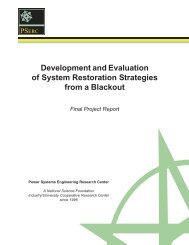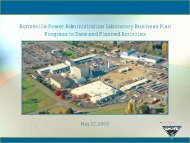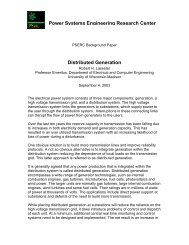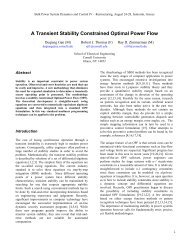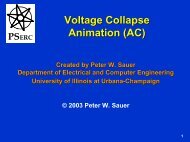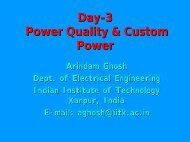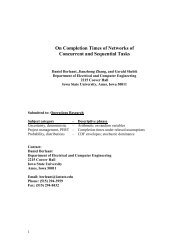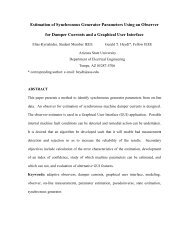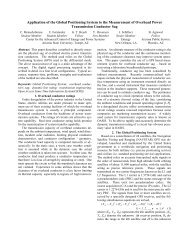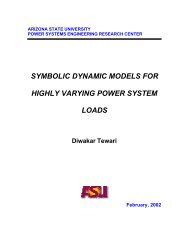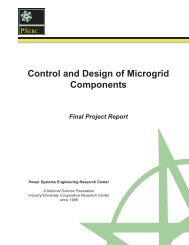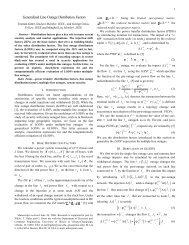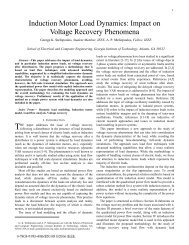Thrive: The Skills Imperative - Power Systems Engineering ...
Thrive: The Skills Imperative - Power Systems Engineering ...
Thrive: The Skills Imperative - Power Systems Engineering ...
You also want an ePaper? Increase the reach of your titles
YUMPU automatically turns print PDFs into web optimized ePapers that Google loves.
23<br />
But America needs to ask: Is just doing more of the same going to be enough in the 21st century? <strong>The</strong><br />
U.S. margin of leadership may depend not just on doing more, but on a strategy for doing things differently.<br />
If the competition has successfully imitated the American innovation model, then we should be thinking<br />
about the new model that will differentiate U.S. capabilities from the rest of the world.<br />
America must be as innovative in talent as it is in technology. Certainly, it will be critical to lead in the fields<br />
that are reshaping the global competitiveness landscape—for example, nanotechnology, biotechnology<br />
and information technologies. But America must also build on core talents and combinations of skills that<br />
differentiate and create a margin of advantage at the innovation frontier, including:<br />
• Educating Renaissance Scientists and Engineers<br />
• Creating a Cadre of Service Scientists<br />
• Leveraging Leadership in Computational Technologies<br />
Educating Renaissance Scientists and Engineers<br />
Science and engineering have become part of global enterprise, and for the first time, American scientists<br />
and engineers are competing head-to-head with their counterparts in other countries.<br />
9. Roadmap To 21st Century <strong>Engineering</strong><br />
Source: James J. Duderstadt, <strong>Engineering</strong> for a Changing World, Millennium Project, University of Michigan.<br />
<strong>The</strong> Flaws of<br />
<strong>Engineering</strong><br />
Today<br />
<strong>The</strong> Needs of<br />
<strong>Engineering</strong><br />
Tomorrow<br />
<strong>The</strong> Destination<br />
Profession<br />
Narrow skills<br />
Employed as a commodity<br />
Globalization<br />
Risk of obsolescence & offshoring<br />
Low prestige<br />
Knowledge Base<br />
Exponential growth of knowledge<br />
Disruptive technologies<br />
Obsolescence of disciplines<br />
Analysis to innovation<br />
Reductionist to information rich<br />
Outsourcing / off-shoring of R&D<br />
Profession<br />
High value added<br />
Global<br />
Diverse<br />
Innovative<br />
Integrator<br />
Communicator<br />
Leader<br />
Knowledge Base<br />
Multi-disciplinary<br />
Use-driven<br />
Emergent<br />
Recursive<br />
Exponential<br />
A New Profession<br />
A learned profession<br />
Practitioner-trained<br />
Worldclass value added<br />
Guildbased rather than employed<br />
High prestige<br />
New R&D Paradigms<br />
Integrated Sci-Tech<br />
Cyberinfrastructure enabled<br />
Stress on creativity/innovation<br />
Discovery / innovation institutes<br />
Education<br />
20th century undergraduate curriculum<br />
High attrition rate<br />
Limited exposure to practice<br />
Unattractive to students<br />
Education<br />
Liberally educated<br />
Intellectual breadth<br />
Professionally trained<br />
Value-driven<br />
Lifelong learner<br />
A New Approach<br />
To Education<br />
Postgraduate professional school<br />
Practitioner-trained/intern experience<br />
Liberal education pre-engineering<br />
Structured lifelong learning<br />
<strong>Engineering</strong> as liberal art discipline<br />
Renewed commitment to diversity



